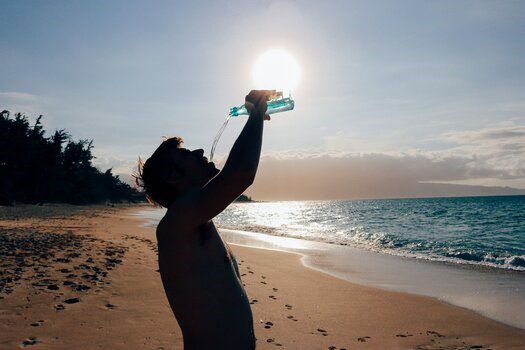By Megan Ng
Trips to the beach, outdoor concerts, camping, and barbecues are all cornerstones of the summer season. These activities and the warm weather and sunshine make it easy to get lost in all the summer fun, but this is where dehydration can sneak up on you. Although it is always important to hydrate, it is even more crucial during the summer months.
Feeling Thirsty?
A person can become dehydrated if they lose as little as 3% of their body weight from water depletion (Collins & Claros, 2011). Here are some common symptoms of dehydration to look out for (Mayo Clinic, 2019):
● Dry, sticky mouth
● Sleepiness or fatigue
● Dark urine
● Dry skin
● Headaches or confusion
● Dizziness or lightheadedness
How Much Should I Be Drinking?
Many sources suggest that adults should be drinking at least eight glasses of water per day. Although this isn’t an incorrect recommendation, fluid and water needs will vary from person to person based on a variety of factors. Some things to consider that may increase or decrease your water intake include (Mayo Clinic, 2019) :
- Activity level: Any activity or exercise that makes you sweat requires extra fluids to balance the water loss. This is water loss is especially true for high-intensity activity and outdoor athletes.
- Environment: Hot or humid weather and high altitudes can increase your fluid needs.
- Age and life cycle: Children, pregnant and lactating women, individuals with illness, and the elderly tend to have increased fluid needs.
- Overall health: Take a look at your hydration routine and be mindful of how you are feeling. Coming down with a fever or experiencing a bout of diarrhea? These circumstances will cause losses in fluids that will need to be replaced.
Make Hydration a Habit: Tips and Tricks
- Fill up on fluids! Be mindful of drinks with caffeine, alcohol, and high sugar because they can contribute to dehydration. Water is the best choice when it comes to hydration. (American Heart Association, 2014). If water tastes too plain, you can try infusing water with fruit to add flavor. Don’t forget to bring a reusable water bottle when you’re on the go.
- Be sensible about your sweat! The more you sweat, the more you need to replenish. Ensure you’re getting enough water before, during, and after activity (American Heart Association, 2015).
- Wear loose-fitting clothing in light colors. Schedule your outdoor workouts during cooler times of the day. Tone down the intensity on super hot days.
- Check your urine. A good measurement of hydration is the color of your urine. Visit Cleveland Clinic for a urine color chart and more information on what your urine could be telling you.
- Eat water-rich foods. Supplement your water intake by eating your way to hydration. Cucumbers, watermelons, grapefruits, strawberries, and cantaloupes are all about 90% water. Vegetable, chicken, and beef soups and broths are tasty and hydrating.
Summary
We lose water every day by sweating, urinating, and breathing. Even the slightest difference caused by the hot summer weather can quickly push you into dehydration. Being aware of your fluid intake will ensure that you can keep up with your summer festivities. Have fun, and remember to drink up!
References:
- American Heart Association. (2015). How to Stay Active in Warm Weather. American Heart Association. Retrieved 29 July 2021, from https://www.heart.org/en/healthy-living/fitness/getting-active/how-to-stay-active-in-warm-weather.
- American Heart Association. (2014). Staying Hydrated – Staying Healthy. American Heart Association. Retrieved 29 July 2021, from https://www.heart.org/en/healthy-living/fitness/fitness-basics/staying-hydrated-staying-healthy.
- Collins, M., & Claros, E. (2011). Recognizing the face of dehydration. Nursing, 41(8), 26-31. https://doi.org/10.1097/01.nurse.0000399725.01678.b7
- Mayo Clinic. (2019). Dehydration – Symptoms and causes. Mayo Clinic. Retrieved 29 July 2021, from https://www.mayoclinic.org/diseases-conditions/dehydration/symptoms-causes/syc-20354086.
By: Megan Ng, Undergraduate Student of Food Science and Human Nutrition at the University of Illinois at Urbana Champaign
Hydration Image by Pixabay













